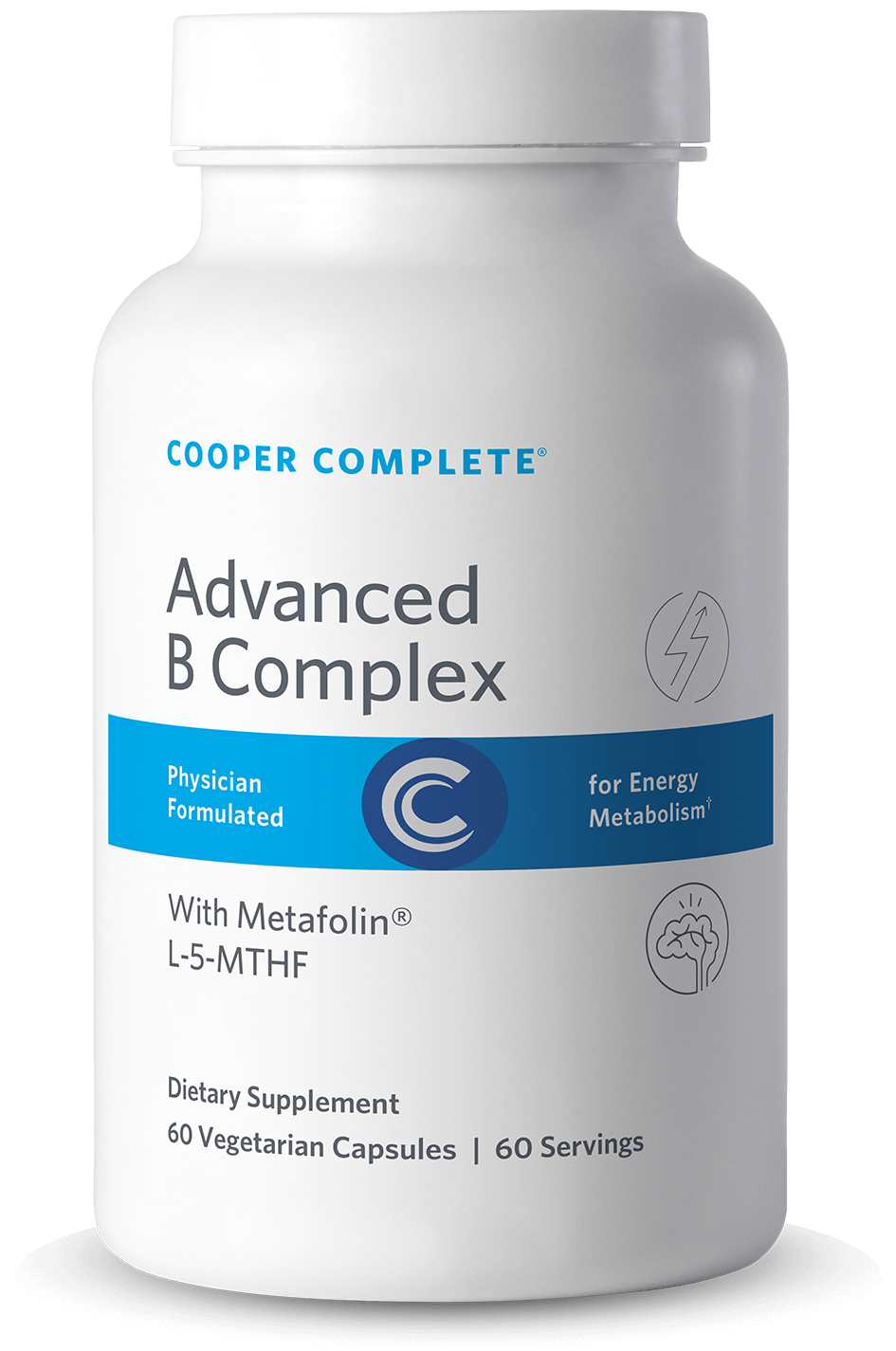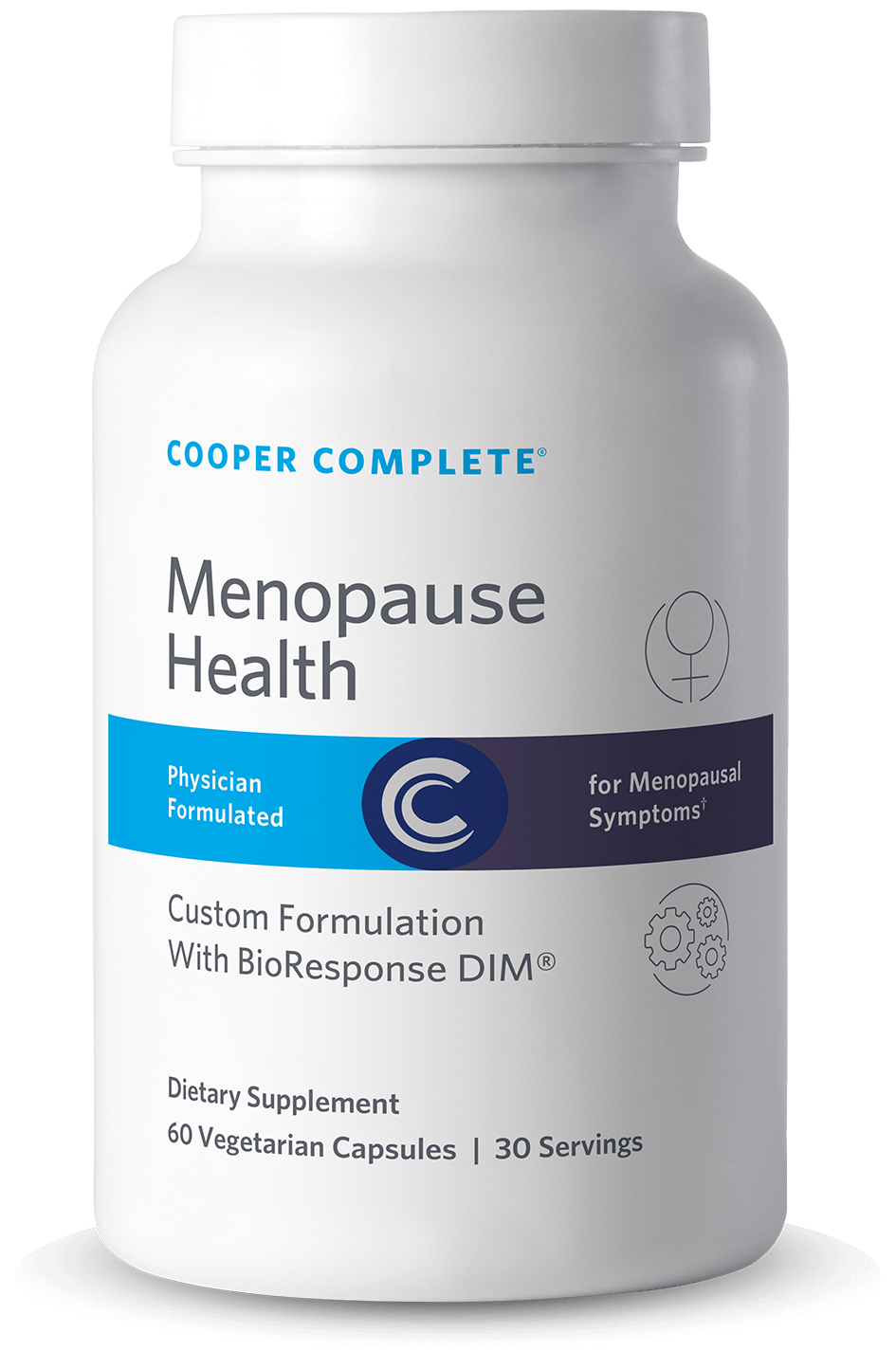Supplements for All Stages of Your Life

Dr. Kenneth Cooper of the world-renowned Cooper Clinic has stressed the importance of exercise, emotional balance and diet to maintain good health for more than 50 years. And when it comes to diet and nutrition, the physicians of Cooper Clinic always recommend a “food first” approach to getting the levels of nutrients a body needs.
The reality is that diet alone often comes up short, making supplementation a necessity to achieve optimal nutrient levels. And, from childhood to our senior years, how our bodies age presents ever-changing needs for nutritional supplementation. This article addresses several life stages and supplement recommendations for each of them.
Pre-School and School-Aged Children
Parents of infants and toddlers usually do a great job feeding their children. Typically, there is no need for vitamin supplementation at that age unless recommended by your child’s pediatrician.
Things begin to change when the child transitions to preschool age, however. With increased exposure to daycare and school, playgroups and food advertising targeting children, the risk of them being over-fed and undernourished becomes an increasingly greater concern for parents. Parents are the providers, but children become the deciders.
So, does your child need a kids’ multivitamin? For the child who is eating a well-balanced diet (along with adequate exercise), a kid’s vitamin probably isn’t needed. On the other hand, parents know their own children best. Children who don’t eat an optimal diet may miss important nutrients like Vitamins A, C, D, calcium and iron. Supplementing their diet with a multivitamin is as good an option for children as it is for adults.
If needed, it’s important to choose your child’s vitamin wisely. Children’s supplements are not unlike their breakfast cereals, with added sugar and artificial flavors disguised and represented as healthy. The level of vitamins and minerals varies dramatically from one brand to the next, so it’s important to review ingredients. In popular chewable “gummy” vitamins, make sure you’re giving your child adequate levels of nutrients with as little sugar as possible.
College Students

Advanced B Complex Supplement
Advanced Vitamin B Complex supplement contains the activated, methylated, most easily absorbable forms of eight essential B vitamins, including biotin and folate, to support cellular energy production and immune, cardiovascular, and neurological health.†
$23.68 Add to cartThe changes in life experienced by college students presents a unique challenge to eating healthily. Vitamins can help supplement what becomes absent from their diets, as well as help cope with the stresses of dorm life and less sleep—all of which can weaken immune systems.
B vitamins create energy from carbohydrates and cannot be produced by the body alone. Diet and nutritional supplements are the preferred sources for all vitamins in this group, including B6, B12, thiamin, niacin, riboflavin and folic acid. Thiamin (B1) helps the body convert carbohydrates into usable energy. Riboflavin (B2) powers cells to produce energy from other nutrients. Niacin (B3) boosts good cholesterol, lowers triglycerides, and is important in converting food into energy. Niacin also supports healthy skin. Vitamin B6 helps create the cells of the immune system. Folic acid (B9) and B12 create DNA and produce new cells, including red blood cells.
Vitamin D to support immunity. Several research studies cited by the Harvard School of Health found that low vitamin D levels, especially in winter months, are associated with suppressed immune response and respiratory infections. Especially in winter months when sunlight is less prevalent, supplements play a more important role in producing enough vitamin D in the body.
Omega-3 to help reduce stress and inflammation. The American Heart Association recommends two servings of fatty fish each week to ensure adequate levels of omega-3. For students managing the stress of college life, Omega 3 helps improve heart health by reducing inflammation, which has been associated with type 2 diabetes and heart disease. Findings from a six-month clinical trial study published earlier this year in The American Journal of Clinical Nutrition found supplementation of the omega-3 eicosapentaenoic acid (EPA) improved overall cognitive function in healthy young adults.
Expectant Mothers
Benefitting both the mother and baby, prenatal vitamins taken before and during pregnancy are an important way to ensure both get the vitamins and nutrients their bodies need for this critical stage of growth in both lives.
Folic Acid for healthy growth and development. The American College of Obstetricians and Gynecologists recommends 600 mcg of folate, while The March of Dimes, CDC and other organizations recommend a daily dose of 400 mcg of folic acid for expectant mothers. This nutrient helps reduce brain and spine birth defects and helps prevent heart defects and cleft palates. Because it’s difficult to get 400 mcg of folate through diet alone, the CDC suggests supplementing, eating fortified foods or a combination of the two.
Omega-3 fatty acids for the baby’s physical development. Researchers have found expectant mothers with low blood levels of DHA have a 10-fold increased risk of early preterm birth. The March of Dimes recommends a minimum of 200 mg of DHA (docosahexaenoic acid) while pregnant, which helps the development of the baby’s eyes and brain.
Vitamin D helps with calcium absorption while helping build healthy immune and nervous systems. Cooper Clinic recommends a daily baseline dose of 50 mcg (2000 IU) of vitamin D to help the mother’s immune system remain active and deliver calcium to the baby for the development of healthy bones and teeth. Vitamin D also supports healthy eyesight and skin.
Iron helps transport oxygen throughout the mother’s body and to her baby. Pregnant mothers should consume approx. 27 mg of iron each day through diet and prenatal vitamins to minimize fatigue, infections and anemia and avoid the risk of low birth weight and premature birth associated with low iron levels in the mother.
Calcium is found in dairy products, as well as green vegetables such as kale and spinach. The American College of Obstetricians and Gynecologists recommends expectant mothers age 19 and older consume 1000 mg of calcium each day. An essential mineral for the development of healthy teeth and bones, calcium and vitamin D team up to help develop a healthy nervous system and strong bones.
Active Men
Heart disease contributes nearly 40 percent to men’s 60 percent higher mortality rate vs. women. Specific supplements can help prevent disease and achieve greater longevity when added to a healthy diet and regular exercise.
Omega-3 may help reduce the risk of heart disease when added to a balanced diet. The American Heart Association recommends at least two servings of fatty fish per week. For individuals who may not obtain adequate levels of omega-3 from their diets, men—and women—can consume 1,200 mg of eicosapentaenoic acid (EPA) and docosahexaenoic acid (DHA) with each daily dose of Cooper Complete Advanced Omega-3.
More than half of men age 60 and older experience an enlarged prostate, and this number increases with age. Caused by hormonal fluctuations, this condition is a symptom of benign prostatic hyperplasia (BPH). While not dangerous, symptoms can create discomfort in the groin and issues with urination, including urgent or frequent urination, weak stream and frequent nighttime trips to the bathroom.
Clinically proven to promote a healthy prostate, Cooper Complete Prostate Health supplement contains nutrients that include saw palmetto, lycopene and pygeum.
Multivitamins help manage stress and prevent illness due to a weakened immune system. Dr. Kenneth H. Cooper’s 8 Steps to Get CooperizedTM includes maintaining a healthy diet and managing stress. Adding a multivitamin to your daily routine helps fill the gaps that diet alone leaves behind.
Cooper Complete Original and Cooper Complete Basic One multivitamins both contain high levels of vitamins A, B, C and magnesium, as well as vitamin D3 (50 mcg/2000 IU) and vitamin E (134 mcg/200 IU). Men generally do not need supplemental iron, so they should choose an iron-free multivitamin unless otherwise advised by their health care provider.
Women of Menopause Age
Menopause is a natural biological process experienced by all women and marks the end of their menstrual cycles, usually affecting women between the ages of 40 and 58. Not a disease or disorder of any kind, menopause symptoms may include mood changes, reduced energy and difficulty sleeping, as well as night sweats and hot flashes.

Menopause Health Supplement
Custom-formulated to assist women in getting restful and rejuvenating sleep by addressing symptoms of anxiety, restlessness, and night sweats.†
$43.48 Add to cartRelief from menopausal symptoms can be achieved with lifestyle adjustments or hormone therapy but can also be found with nutritional supplements like Cooper Complete Menopause Health. This custom formulation was designed to help manage menopause symptoms by producing a woman’s healthy estrogen levels.
Omega-3 fatty acids are cardioprotective and significantly reduce the risk of cardiovascular events. They lower blood pressure and reduce blood clot risk. Several studies suggest higher intake of the long chain omega-3 fatty acids EPA and DHA are associated with a lower risk of breast cancer. The 2020-2025 Dietary Guidelines for Americans recommends 8 or more ounces per week of seafood, and that some of the seafood consumed be choices with higher amounts of EPA and DHA.
Multivitamins help to augment the diet to support a healthy immune system. With age, women need fewer calories, and a multivitamin helps fill gaps that may result in the diet. Before menopause, women should select a multivitamin that contains iron. After the cessation of the menstrual cycle, a multivitamin without iron is recommended.
Seniors
Aging comes with a whole litany of conditions that impact the overall quality of life. Taking the right supplements, along with a healthy diet, can help provide relief to conditions like chronic inflammation, joint pain, low energy and immunity levels.
Vitamin B12 is less easily absorbed by the body as people age, with low B12 levels more prevalent in adults over the age of 50. Cooper Clinic recommends B12 levels of at least 450 picograms per milliliter (pg/mL), compared to the normal range of 254-1320 pg/mL, to help avoid issues associated with B12 deficiency, including anemia and, in some cases, nerve damage.
Vitamin D is best absorbed by the skin from direct sunlight and helps support heart and bone health. Cooper Clinic physicians recommend 50 mcg (2000 IU) of vitamin D per day to avoid the problems commonly associated with low vitamin D levels, such as lowered immunity, osteoporosis and depression. Cooper Complete offers three vitamin D3 products, including 25 mcg (1000 IU) Gummy, 25 mcg (1000 IU) or 125 mcg (5000 IU) softgel servings.
Omega-3 Fatty Acids are commonly found in fatty fish, such as salmon, to help improve heart health and reduce inflammation. When diet alone doesn’t fulfill the American Heart Association’s recommendation of two servings of fatty fish per week, supplement healthy levels of omega-3 with Cooper Complete Advanced Omega-3.
Glucosamine and chondroitin help provide relief from joint pain and chronic inflammation while slowing the progression of osteoarthritis. Not found naturally in food, supplementation is necessary to benefit from these nutrients. In addition to glucosamine and chondroitin, Cooper Complete’s custom-formulated Joint Health Supplement includes magnesium, gelatin and bromelain to lubricate joints and fight inflammation.
Calcium is an essential nutrient for healthy bones and teeth and should be consumed primarily in the diet. While spinach, kale, orange juice and dairy products help deliver calcium to the body, seniors can have difficulty getting adequate levels from food, and supplementation may be necessary. Take Cooper Complete Calcium Citrate, which offers 500 mg calcium per two each two tablet serving, along with other nutrients such as Vitamin D and magnesium and weight-bearing exercises to help support bone health.
No matter what your current age or lifestyle, your health care provider understands your health profile best, including your medical history, risks and current medication and supplement use. Talk to your physician about which supplements are best for you.
